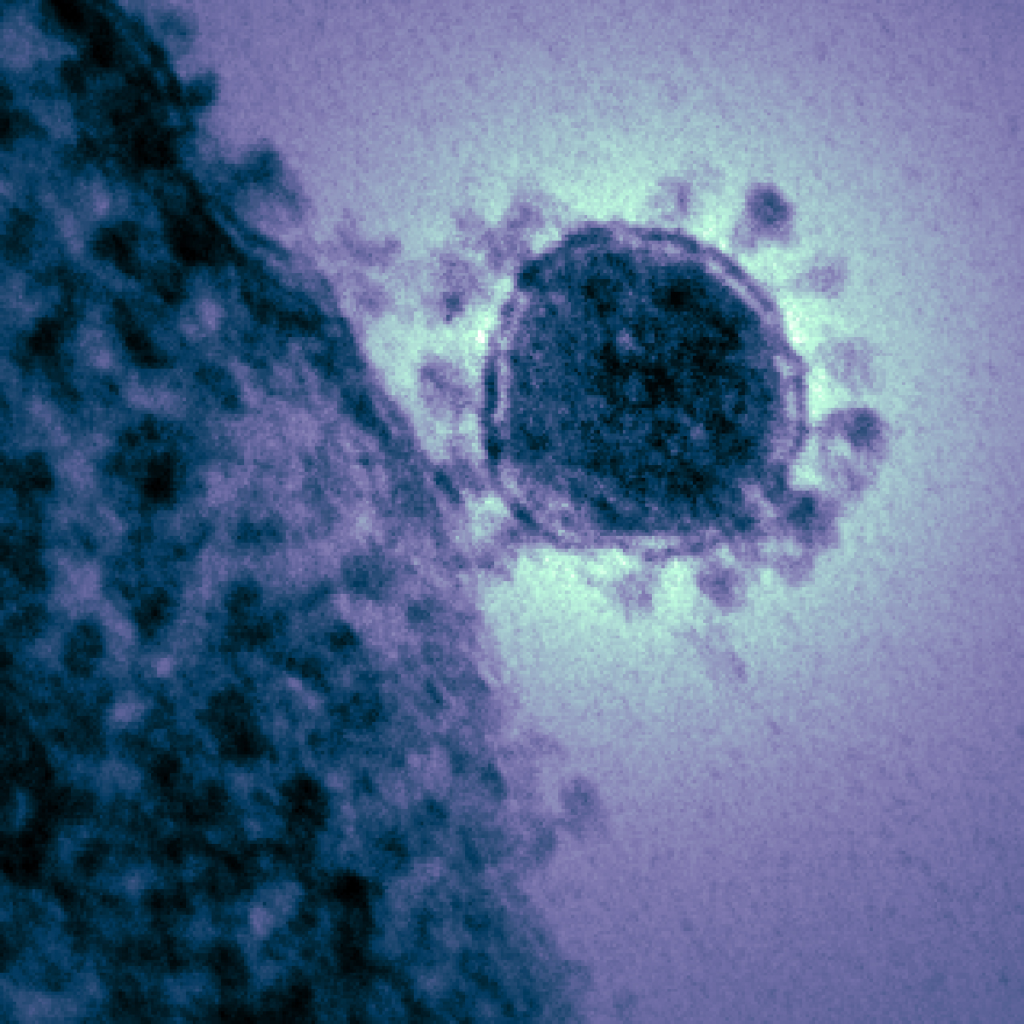Once the purview of virology researchers, the word “coronavirus” is now part of the vernacular in the mainstream media as reports of quarantined cruise ships (1) and makeshift hospitals (2) fill our online news feeds. While there is currently no approved anti-viral treatment for coronavirus infection (3), a team led by researchers from Vanderbilt University recently published work characterizing the anti-CoV activity of a compound, which they now plan to test against 2019-nCoV (4).
Developing New Therapeutics Against Coronaviruses
Coronaviruses (CoVs) are enveloped, single-stranded RNA viruses that exhibit cross-species transmission—the ability to spread quickly from one host (e.g., civet) to another (e.g., human). Scientists classify CoVs into four groups based on the nature of the spikes on their surface: alpha (α), beta (ß), gamma (γ) and delta (δ, 1). Only the alpha- and beta-CoVs can infect humans. Four coronaviruses commonly circulate within human populations: Human CoV 229E (HCoV229E), HCoVNL63, HCoVOC43, and HCoVHKU1. Three other CoVs have emerged as infectious agents, jumping from their normal animal host species to humans: SARS-CoV, MERS-CoV and most recently, 2019-nCoV (5).

The need for an effective, broad spectrum treatment against HCoVs, has been brought into sharp focus by the recent outbreak of the 2019 Novel Coronavirus (2019-nCoV; 6).
Finding a Candidate Compound
One way to develop therapeutics against coronaviruses is to identify compounds that affect critical processes in the viral life cycle, such as viral replication. An ideal anti-viral compound would specifically target the virus, have low cytotoxicity to the host cells, and work through a mechanism that does not allow the rapid development of viral resistance.
Nucleoside analogs are a class of compounds that mimic naturally occurring nucleosides, required for replication. Mutagenic nucleoside analogs not only interfere with replication, but induce mutations within the target virus, a strategy known as “lethal mutagenesis”. Several mutagenic nucleoside analogs such as 5´ fluorouracil and ribavirin, have proven effective against a host of RNA viruses including H1N1 flu virus (6). However, mutagenic nucleoside analogs have not proven effective against CoVs, presumably because of a 3´to 5´ exonuclease proofreading activity possessed by the viruses (7).
A collaboration among several research groups from Emory University (Atlanta, GA), Vanderbilt University School of Medicine (Nashville, TN) and the University of North Carolina (Chapel Hill, NC) demonstrated that ß-d-N4-Hydroxycytosine (NHC), a cytidine analog (7), is a specific inhibitor of two ß-CoV viruses, MHV and MERS-CoV . This compound has previously been shown to inhibit several viruses including RSV, Ebola, Hepatitis C, Norovirus and Ebola virus, among others (7).
Effective, Minimal Cytoxicity and Low Resistance
Agostini and colleagues first investigated whether NHC could inhibit CoV replication of two ß -CoVs: the model murine hepatitis virus (MHV) and the MERS-CoV in a dose-dependent manner. They were able to demonstrate that both MHV and MERS-CoV show a dose-dependent decrease in viral titer. Additionally they showed that this decrease in titer was the result of specific anti-viral activity rather than a generalized cytotoxic effect by measuring cell viability using the CellTiter-Glo Cell Viability Assay. Both cell viability and cytotoxic data indicate that the cytotoxic concentration of the NHC inhibitor is orders of magnitude larger than its EC50 for inhibiting the viruses.
They next investigated the mechanism of NHC inhibition of viral replication, specifically asking if there was a mutagenic effect. They showed that NHC significantly inhibited MHC viral replication when added early in infection. The also showed that the specific infectivity of WT MHV was reduced in a dose-dependent manner when treated with NHC.
Next generation sequencing of NHC-treated viral populations released after a single round of replication revealed a dose-dependent increase of low-frequency mutations. Passaging the virus in the presence of NHC also indicated that only low-level resistance to the compound was seen.
Summary
While this research did not look at the NHCs effect on 2019-nCoV , it did reveal that NHC is a specific inhibitor of two other ß -CoV viruses (MHC and MERS-CoV). In addition this inhibition of viral replication had a low rate of resistance and did involve (at least in part) a mutagenic mechanism.
Emory University recently announced that they will be collaborating to test the effectiveness of this compound against 2019-nCoV (8).
Literature Cited
- Denyer, S. and Tayor, A. (2020) Coronavirus live updates: Cruise-ship infections surge as thousands remain quarantined. [Internet: https://www.washingtonpost.com/world/asia_pacific/coronavirus-china-live-updates/2020/02/10/67115416-4b9a-11ea-bf44-f5043eb3918a_story.html Accessed : February 10, 2020]
- XINHUANET (2020) Makeshift hospital in Wuhan receives coronavirus-infected patients [Internet: http://www.xinhuanet.com/english/2020-02/08/c_138766645.htm Accessed: February 10, 2020]
- Centers for Disease Control and Prevention, U.S. (2020) Coronavirus: About Coronavirues, Prevention and Treatment. [Internet: https://www.cdc.gov/coronavirus/about/prevention.html Accessed February 10, 2020] Updated Link May 6, 2024: https://www.cdc.gov/coronavirus/2019-ncov/your-health/about-covid-19.html
- Agostini, M.L. et al. (2019) Small-Molecule Antiviral ß-d-N4-Hydroxycytosine Inhibits a Proofreading-Intact Coronavirus with a High Genetic Barrier to Resistance J. Virol. 93, e01348-19. Internet: https://jvi.asm.org/content/93/24/e01348-19 Accessed: February 10, 2020]
- Centers for Disease Control and Prevention, U.S. (2020) Coronavirus: About Human Coronavirus Types. [Internet: https://archive.cdc.gov/#/details?url=https://www.cdc.gov/coronavirus/types.html; Accessed February 10, 2020] Now archived at: https://archive.cdc.gov/#/details?url=https://www.cdc.gov/coronavirus/types.html
- Villanueva, J. What We Know about the 2019 Novel Coronavirus. Promega Connections. [Internet: https://www.promegaconnections.com/2019-novel-coronavirus/ , Accessed February 10, 2020]
- Pauly, M.D. and Lauring, A. S. (2015) Effective Lethal Mutagenesis of Influenza Virus by Three Nucleoside Analogs. J. Virol. [Internet: https://jvi.asm.org/content/89/7/3584 Accessed February 10, 2020]
- Emory University (2020) Emory, collaborators testing antiviral drug as a potential treatment for coronaviruses. [Internet: http://news.emory.edu/stories/2020/02/coronavirus_eidd/index.html Accessed February 10, 2020]
Related Posts
Michele Arduengo
Latest posts by Michele Arduengo (see all)
- The Casual Catalyst: Science Conversations and Cafes - July 18, 2024
- Cancer Moonshot: Solving Tough Problems - May 28, 2024
- Automated Sampling and Detection of ToBRFV: An Emerging Tomato Virus - April 25, 2024
